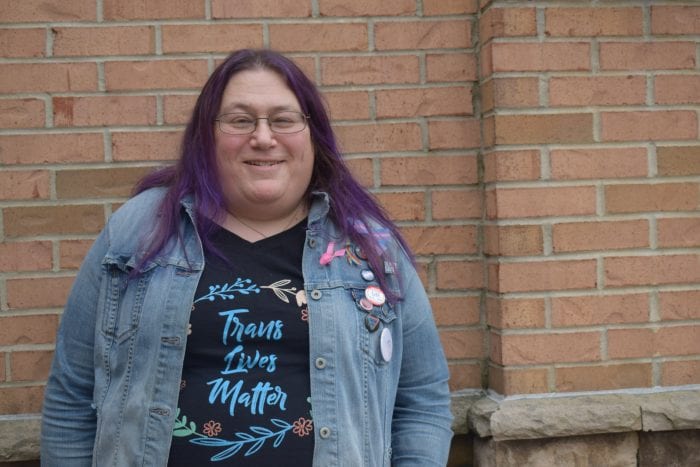Transgender Awareness Month, Giving a Voice to the Voiceless

Her name was always Erica.
Erica Forman, of Hauppauge, began to transition her gender from male to female in her late 20s. In 2012, she officially changed her name to Erica, one of two names her mother loved before she knew the sex of her baby 51 years ago.
“This would have been my name,” Forman said. “Back then, you had to choose two names, so Erica was the name that was planned.”
Forman chose to share her story to commemorate Transgender Awareness Month. November has been dedicated to the transgender community across the country in hopes of bringing awareness to a community that rarely has a voice. Nov. 20 is dedicated to solemnly remember the lives lost to anti-trans violence on Transgender Day of Remembrance.
‘I’m lucky I live here. There are parts of the country that I might go to, where I wouldn’t wear this shirt.’
—Erica Forman
According to GLAAD, an LGBTQ+ media force, TDOR was started in 1999 by transgender advocate Gwendolyn Ann Smith as a vigil to honor the memory of Rita Hester, a transgender woman who was brutally killed in 1998 as a hate crime. The vigil, to take place Nov. 20, commemorates all the transgender people lost to violence since Hester’s death, something now called the annual Transgender Day of Remembrance.
This year, more than 30 transgender people were killed in acts of violence as of Oct. 6, according to the nonprofit Human Rights Campaign. The campaign reported it has not seen such a level of violence at this point of the year since it began tracking that data in 2013.
Forman said she knew something was different as a child. At around age 12, she began experimenting when her mother wasn’t home.
“I never really understood why I identified with girls’ things growing up, but I couldn’t really be open about it,” she said. “I spent a good amount of my time pre-transition trying to fit in.”
In college she was in a fraternity. “I love those guys,” she said. “They’re my brothers and I’m their sister now.”
David Kilmnick, president and chief executive officer of Long Island’s LGBT Network, said acknowledging this month is important because it sheds light to issues that are rarely talked about.
“We’re bringing visibility and awareness about the trans community and the issues our trans community faces,” he said. “We join together as one community to stop hate against all groups, particularly the issues of violence against trans women and women of color that are kept in the closet.”
Kilmnick said the names of those who perished from hate crimes are rarely ever said.
“This brings together our community to speak out and say whatever is on your mind — say what you want to see happen,” he said. “Say the names of those who were murdered by hate violence, so we don’t have to say another name ever again.”
Transgender people often experience harassment in the day to day, such as in the workplace.
After more than a decade presenting as male at work, Forman decided to transition full-time in 2008.
“At my job, I experienced a whole a lot of resistance,” she said. “HR confronted me and said, ‘You know, we hired a man.’”
She said the job forced her to wear a tag with the male name she was assigned at birth, because she was still going through the lengthy and arduous process to legally become Erica on paper.
“It was awful,” she said. “Eventually I was able to hold on to it, and transition at the job, but it was a fight. There was a fight almost all the way. It’s one of those very difficult things that we face, finding work as our authentic selves — there’s just a lot of bias, and people will find other reasons not to hire you.”
Forman said she shared her story as an advocate to the trans community to let people out there know that things will be okay.
“Would you rather be happy, or would you rather be miserable?” she said. “My days are filled with me wanting to be alive and wanting to do things, and now I’m able to interact with the world, like I never did before.”
Along with the LGBT Network, The Transgender Resource Center of Long Island, based in Manorville, is a relatively new nonprofit established by members of the transgender, non-binary and gender non-conforming community, their families, partners and allies.
“We’ve helped hundreds of people,” said Ursula Nigro, the director of operations for the center. “Whether it’s a call for a resource, support groups, hooking people up together to go and rent spaces — we have a lot of homelessness in the trans community and it’s super difficult.”
Nigro helped found the group four years ago when her wife started transitioning. Their goal was to create a space that will help the local transgender community, while educating businesses, schools and offices on inclusivity training.
“Trans folks want to be treated with respect and dignity just like everyone else,” she said. “I think there’s a fear that needs to be extinguished, and people need to be aware that quite a large population of the world is trans. It’s not a choice and it’s not a mental illness.”
The month of November, especially this week ending Nov. 20, has become a time for the trans community to communicate tolerance.
“You’ve met somebody who’s trans in your life,” Forman said. “And did it hurt? Did that encounter hurt you? No, it doesn’t hurt anybody. The worst it does is wounds somebody’s heart and their memory of you.”
Being transgender means something different to each and every person.
“The best way to think about is people need to be comfortable in their bodies and their identity and that looks different for lots of people,” Forman said. “That’s why identity is something in your soul. Only you know what feels right, what fits right and what sounds right.”
On Friday, Nov. 20, The LGBT Network will be hosting Transgender Day of Remembrance: Speak Out, a free virtual event to share stories to remember the lives lost this year to transphobic violence.
“Speak Out is for everyone to join,” Kilmnick said. “It’s not just for the trans community — We have to join together to stop hate and violence.”






